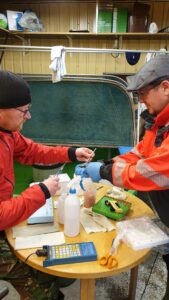Flavobacterium columnare is the etiological cause of columnaris disease, which predominantly manifests itself as ulcerations of the gills and of the skin. Mortality due to columnaris disease is especially high in young fish in warm water, reducing fish welfare and causing significant losses to aquaculture industry. We validated the usefulness of genomic selection for survival to columnaris disease in rainbow trout, and implemented the methods in the commercial broodstocks with the AquaIMPACT company partner, Savon Taimen Oy.
Results description
Using around 28,000 DNA markers (SNPs; single nucleotide polymorphism), we genotyped over 4,500 rainbow trout that experienced a natural columnaris disease outbreak at a commercial fish farm. The fish originated from two broodstocks, one from Savon Taimen Oy, a Finnish rainbow trout breeder and fingerling producer based in Rautalampi, and the second from the national breeding programme maintained by the Natural Resources Institute Finland (Luke), based in Enonkoski research farm (Calboli et al. 2022; Fraslin et al. 2022).
The key findings:
- Survival against F. columnare was moderately heritable in both populations.
- We found both common and population-specific or sex-specific genomic regions (QTLs; quantitative trait loci) that influence survival. Some of the regions have been shown to occur in other populations too and associated to another bacterial disease in cold water.
- Selection accuracy of pedigree-based breeding values was 0.59 (PBLUP).
- The use of genomic prediction (GBLUP) resulted in an increase of 16% in accuracy compared to the pedigree-based prediction, and the use of weighted approach that gives even more weight to the SNPs in the QTLs (wGBLUP) resulted in a 19% increase in accuracy.
These results imply that genomic evaluation using the data from industry can be used to accurately predict the genetic superiority of the broodstock fish, and that the modelling of the major genomic regions (e.g. QTLs) influencing resistance is beneficial.

Heikki Koskinen and Miika Raitakivi from Luke preparing tissue sampling of rainbow trout at a commercial multiplier farm.
Impact and who will benefit:
The intensive company-researcher co-doing showed once again the power of genomic selection in aquaculture. The direct impacts of the work are:
- The results were convincing, and hence genomic selection was implemented in the commercial broodstocks with the AquaIMPACT company partner, Savon Taimen Oy. There are indications that the offspring generation has a reduced mortality against the pathogen.
- The improvement of disease resistance, by any means, is essential to make aquaculture more sustainable and to improve fish health and welfare.
- Even though columnaris disease typically attacks small fingerlings, the disease has a long lasting carry-over effects on reduced fish performance in on-growing.
- To selectively breed for improved disease resistance is a powerful general tool to reduce the use of anti-biotics in animal production, one key objective of EU Farm to Fork strategy. There is no effective vaccine available against columnaris disease in salmonid species.
- Selection for improved survival may also help rainbow trout adapt to climate change. Indeed, columnaris disease affects freshwater fish species at warm water temperatures, typically above 20°C. Climate change is increasing temperatures worldwide, affecting inland water temperatures, with direct repercussions on water temperatures in fish ponds and tanks, potentially leading to more frequent columnaris outbreaks.
Partners involved
- Savon Taimen Oy
- Natural Resources Institute Finland (Luke)
- The Roslin Institute and Royal (Dick) School of Veterinary Studies, University of Edinburgh, Edinburgh, United-Kingdom
References
Calboli F, Koskinen H, Nousiainen A, Fraslin C, Houston RD, Kause A. 2022. Conserved QTL and chromosomal inversions affect resistance to columnaris disease in two rainbow trout (Oncorhyncus mykiss) populations. G3: Genes, Genomes, Genetics 12(8). https://doi.org/10.1093/g3journal/jkac13
Fraslin C, Koskinen H, Nousianen A, Houston RD, Kause A. 2022. Genome-wide association and genomic prediction of resistance to Flavobacterium columnare in a farmed rainbow trout population. Aquaculture 557: 738332. https://doi.org/10.1016/j.aquaculture.2022.738332
